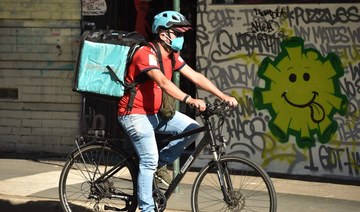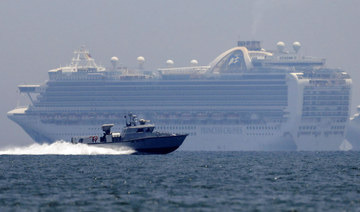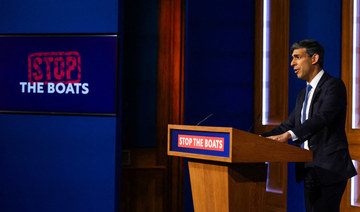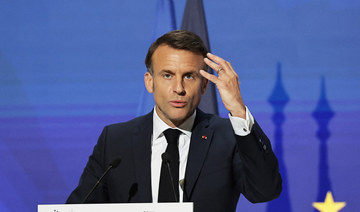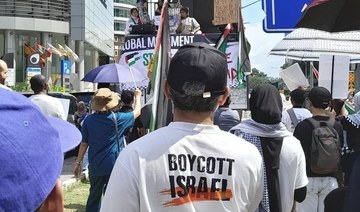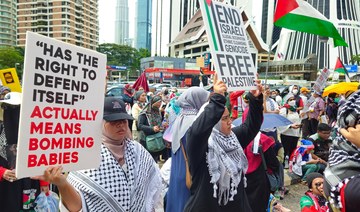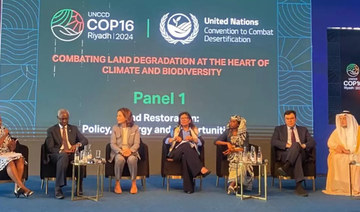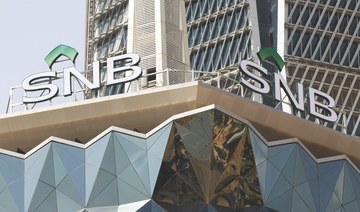MELBOURNE: Australia’s most populous state, home to Sydney, will allow restaurants, playgrounds and outdoor pools to reopen on Friday as extensive testing has shown the spread of the coronavirus has slowed sharply, New South Wales state’s premier said on Sunday.
The state has been worst hit by the coronavirus in Australia, with about 45 percent of the country’s confirmed cases and deaths. However, it recorded just two new cases on Saturday out of nearly 10,000 people tested, clearing the way for a cautious loosening of lockdown measures.
“Just because we’re easing restrictions doesn’t mean the virus is less deadly or less of a threat. All it means is we have done well to date,” Premier Gladys Berejiklian told reporters on Sunday.
From May 15, New South Wales will allow cafes and restaurants to seat 10 patrons at a time, permit outdoor gatherings of up to 10 people, and visits of up to five people to a household.
Playgrounds and outdoor pools will also be allowed to reopen with strict limits.
The moves are in line with a three-step plan to relax lockdown measures outlined by the Australian government on Friday, which would see nearly 1 million people return to work by July.
Places of worship in New South Wales (NSW) will be permitted to open to up to 10 people from Friday. Weddings, which had been restricted to two guests, will be able to host up to 10, and indoor funerals will be allowed to have 20 mourners.
Schools in NSW are set to reopen from Monday, but only allowing students to attend one day a week on a staggered basis.
Berejiklian gave no time frame for any further reopening of the economy, saying that would depend on infection rates.
“We continue to take a cautious approach in New South Wales, but also one which has a focus on jobs and the economy, because we can’t continue to live like this for the next year or until there is a vaccine,” Berejiklian said.
NSW and Victoria, which has had the second-highest number of COVID-19 cases and deaths in the country, have maintained their tight restrictions longer than other states.
Victoria’s premier said he would announce plans for easing lockdown measures in the state on Monday.
Dozens of people protested against the lockdown measures outside Victoria’s state parliament in Melbourne on Sunday, leading police to arrest 10 people for breaching coronavirus restrictions on large gatherings.
“It’s incredibly disappointing that people would be protesting or seeking to suggest we don’t have a pandemic,” Victoria Health Minister Jenny Mikakos told reporters.
Meanwhile Australia’s chief medical officer, Brendan Murphy, told reporters in Canberra that state and federal officials will meet on Monday to discuss ways of dealing with the risks of crowds on public transport as businesses start to reopen.
Western Australia (WA), which shut its borders to combat the spread of the virus and has had only 1 new COVID-19 case in the past 11 days, has moved faster than other states in easing restrictions.
On Sunday, WA Premier Mark McGowan said from May 18 the state would allow indoor and outdoor gatherings of up to 20 people, including at cafes and restaurants.
Queensland state will allow restaurants, pubs and cafes to reopen with up to 10 people at a time from next Saturday, and said it would increase that to 20 people from June 12.
In South Australia, from Monday, holiday travel will be allowed within the state, in a push to revive tourism that has been devastated this year by bush fires and the coronavirus.
Australia’s biggest state to ease coronavirus lockdown from May 15
https://arab.news/v8zer
Australia’s biggest state to ease coronavirus lockdown from May 15

- New South Wales has been worst hit by the coronavirus in Australia
- ‘Just because we’re easing restrictions doesn’t mean the virus is less deadly or less of a threat’
South Sudan removes newly imposed taxes that had triggered suspension of UN food airdrops
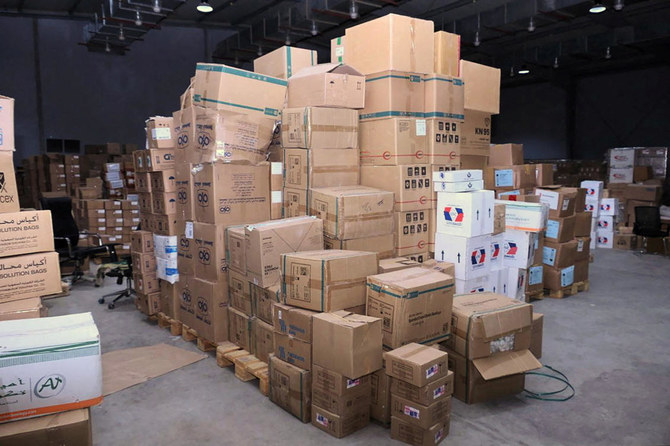
There was no immediate comment from the UN on when the airdrops could resume
JUNA, South Sudan: Following an appeal from the United Nations, South Sudan removed recently imposed taxes and fees that had triggered suspension of UN food airdrops. Thousands of people in the country depend on aid from the outside.
The UN earlier this week urged South Sudanese authorities to remove the new taxes, introduced in February. The measures applied to charges for electronic cargo tracking, security escort fees and fuel.
In its announcement on Friday, the government said it was keeping charges on services rendered by firms contracted by the UN peacekeeping mission in South Sudan.
“These companies are profiting ... (and) are subjected to applicable tax,” Finance Minister Awow Daniel Chuang said.
There was no immediate comment from the UN on when the airdrops could resume.
Earlier, the UN Humanitarian Affairs Agency said the pausing of airdrops had deprived 60,000 people who live in areas inaccessible by road of desperately needed food in March, and that their number is expected to rise to 135,000 by the end of May.
The UN said the new measures would have increased the mission’s monthly operational costs to $339,000. The UN food air drops feed over 16,300 people every month.
At the United Nations in New York, UN spokesman Stéphane Dujarric said the taxes and charges would also impact the nearly 20,000-strong UN peacekeeping mission in South Sudan, “which is reviewing all of its activities, including patrols, the construction of police stations, schools and health care centers, as well as educational support.”
An estimated 9 million people out of 12.5 million people in South Sudan need protection and humanitarian assistance, according to the UN The country has also seen an increase in the number of people fleeing the war in neighboring Sudan between the rival military and paramilitary forces, further complicating humanitarian assistance to those affected by the internal conflict.
More migrant dinghies cross Channel to England despite Rwanda threat
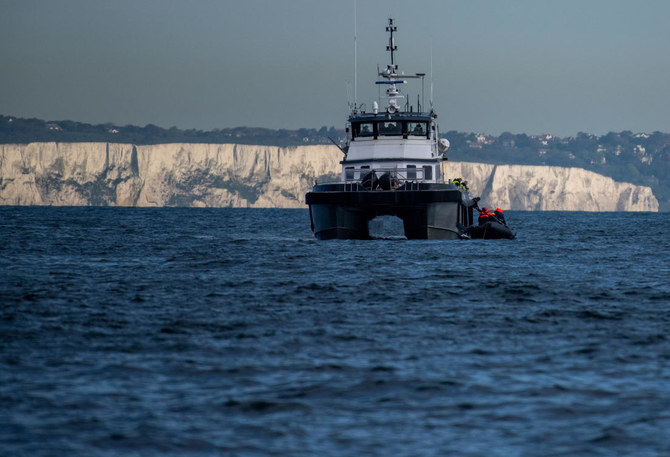
- The arrivals illustrate the difficulties British Prime Minister Rishi Sunak faces on his pledge to tackle illegal migration and “stop the boats“
- Sunak hopes his flagship Rwanda policy to deport those arriving in Britain without permission to the African nation will deter people from making the Channel crossing
STRAIT OF DOVER: Dozens of people in two rubber dinghies reached the southern coast of England on Saturday, the latest among thousands of asylum-seeking migrants to make the risky sea crossing from France this year.
Bobbing on the waves of the English Channel on a clear morning, the boats sailed across the narrow strip of sea separating France and Britain, with a French naval vessel following them until they reached English waters.
Their largely male passengers, some of whom were in orange life jackets and waving, were taken aboard a British Border Force vessel off Dover.
The arrivals illustrate the difficulties British Prime Minister Rishi Sunak faces on his pledge to tackle illegal migration and “stop the boats,” ahead of a national election expected later this year.
More than 8,000 people have arrived so far this year on small boats, with many fleeing war or famine and traveling through Europe to Britain, making the start of this year a record for such arrivals.
Sunak hopes his flagship Rwanda policy to deport those arriving in Britain without permission to the African nation will deter people from making the Channel crossing. Five people died in the attempt last month.
The government hopes to operate the first flights to Rwanda in 9-11 weeks.
“The unacceptable number of people who continue to cross the Channel demonstrates exactly why we must get flights to Rwanda off the ground as soon as possible,” a spokesperson for Britain’s Home Office said.
“We continue to work closely with French police who are facing increasing violence and disruption on their beaches as they work tirelessly to prevent these dangerous, illegal and unnecessary journeys.”
UK opposition suffers major Muslim vote losses in local elections
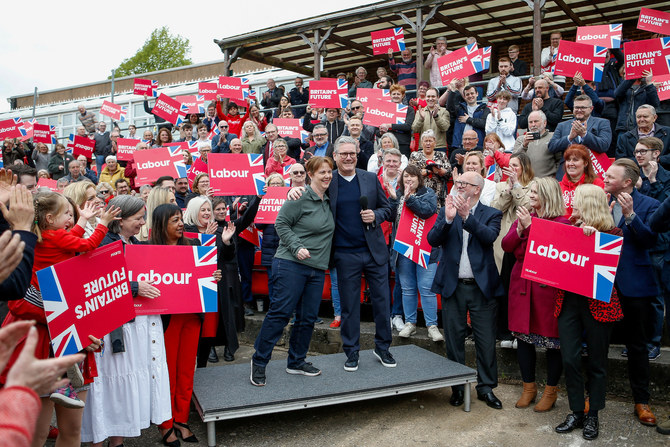
- Shadow home secretary: ‘Many people feel really strongly’ about Gaza ‘and rightly’
- Labour MP: ‘It’s not just Muslims. On our doorknocks, we’ve had a lot of middle-class white voters raise it as well’
LONDON: A series of local election victories by the UK’s opposition Labour Party has been overshadowed by a major fall in support among Muslim voters, leading to concern within the party ahead of a general election later this year.
After local elections were held across the country on Thursday, Labour suffered key losses in areas with high Muslim populations due to controversies over the party’s stance on the Gaza war.
Labour must do some “searching” in response to “questions” over its performance, one MP said.
The potential loss of Labour candidate Richard Parker in the West Midlands mayoralty election led to a racism row after an unnamed party source blamed “the Middle East” on deciding the race.
In total, the party gained more than 140 council seats during the elections, The Guardian reported.
But those gains are overshadowed by the potential West Midlands defeat and the Conservative candidate for mayor of London, Susan Hall, running a closer race against incumbent Sadiq Khan than previously expected.
Labour have “trouble brewing on their left flank” after focusing on traditionally rural and whiter areas, said Rob Ford, a politics professor at the University of Manchester.
“There has been a substantial loss of support in heavily Muslim areas and they are going backwards a bit in progressive areas and areas with students. It is progress at a price,” he added.
By offsetting urban losses with gains among rural voters, Labour would win about 34 percent of votes at a general election compared to 25 percent for the Conservatives, the BBC reported.
Yet fear of bleeding urban voters, including Muslims, is driving anxiety in the party ahead of the general election, sources told The Guardian.
“The polls (which predicted a 20-point lead for Khan) were completely wrong, this is going to be much closer than expected,” one source said.
A source in Birmingham, where independent candidate Akhmed Yakoob stood as a spoiler to Labour, said: “Yakoob is picking up over 50 percent in some inner-city wards, so the Gaza impact may be bigger than first estimated.”
Labour also suffered a shock loss in Oldham, losing control of the council after a number of seats were taken by pro-Palestinian independent candidates.
In Manchester, the party lost its deputy leader to a candidate from MP George Galloway’s Workers Party of Britain.
Jess Phillips, Labour MP for Birmingham Yardley, told the “Electoral Dysfunction” podcast in the wake of the vote that the party will have to “wake up and face” the issues that led to losses against independent and Workers Party of Britain candidates.
“I very much expect, as the mayoral votes come in, that in places like Birmingham, Bradford, places with high Muslim populations, as we’ve seen overnight in Oldham, that the Labour Party will have some questions that they have, and some searching to do themselves,” she added, according to Sky News.
Areas with a proportion of Muslim voters higher than 20 percent recorded average losses of 17.9 points for Labour.
The comments by a party source concerning the West Midlands race have led to a post-election race row.
“It’s the Middle East, not West Midlands that will have won (Conservative Mayor Andy) Street the mayoralty. Once again Hamas are the real villains,” the Labour source reportedly told the BBC.
The remarks were condemned by figures including Labour MP Bell Ribeiro-Addy, the Daily Telegraph reported.
“This is a disgusting way to talk about Muslim voters, conflating them with Hamas and treating them as a monolith,” she said. “It reeks of racism and entitlement. Such comments should have no place in the Labour Party.”
According to The Times, MP Zarah Sultana said: “Once again, I’m deeply disturbed by Islamophobic quotes given to the media by ‘Labour sources.’
"When politicians are confronted with racist bile, it should be immediately condemned. As a party we need to listen to and acknowledge concerns, not hold British Muslims in contempt.”
Yvette Cooper, Labour’s shadow home secretary, conceded that the party’s stance on a Gaza ceasefire was “partly” a factor in the surprise defeats.
“Many people feel really strongly about this — and rightly, because tens of thousands of people have been killed, including the majority of them women and children,” she said.
Muslim vote organizers hailed the success of the elections in sending a message to Labour leader Keir Starmer.
Party sources warned that Labour must work overtime to regain the trust of Muslim voters ahead of a general election expected later this year.
“People use local elections to send the government — and sometimes the opposition — a message,” a senior Labour source told The Times.
“The damage is done and even though our position is much better now, if Israel pushes into Rafah people will say we didn’t do enough to urge restraint right at the start.”
A Labour MP added: “It’s terminal with a lot of people, and it’s not just Muslims. On our doorknocks, we’ve had a lot of middle-class white voters raise it as well.”
KFC stores in Malaysia shutter amid anti-Israel boycott

- KFC is not on Malaysian boycott movement’s list, but consumers see it as linked to Israel
- Franchise operator cites ‘challenging economic conditions’ as reason for closures
KUALA LUMPUR: Scores of KFC outlets have closed in Malaysia amid calls to boycott the chain and other brands accused of links with Israel.
Since the outbreak of Israel’s deadly attacks on Gaza in October, many Malaysian citizens have backed a growing refusal to buy products from the Western companies seen as having relations with Tel Aviv.
KFC is among a number of brands that have been reeling from falling revenues, as those who join the boycott movement see them facilitating the Israeli strikes, which have already killed nearly 35,000 people in the Palestinian territory, mostly women and children.
The US-origin fast-food chain has closed more than 100 outlets across Malaysia since October, according to local media estimates.
KFC Malaysia operator QSR Brands Holdings admitted in a statement earlier this week to a temporary closure to “manage increasing business costs,” which it attributed to “challenging economic conditions.”
QSR Brands did not say how many outlets had been closed or if the action was due to a loss in sales caused by the boycott.
The company, which runs over 600 KFC restaurants across the Southeast Asian nation, said staff from affected outlets were given the opportunity to “relocate to busier” stores.
Major companies with international brand names in Malaysia have in recent months reported losses due to the boycott, even if they were not original targets of the action.
In February, the parent company of the US-origin coffee chain Starbucks in Malaysia said the snub by customers led to a near 40 percent drop in revenue. The news followed an earlier claimed loss of profits and job cuts by the country’s McDonald’s franchise.
The anti-Israel boycott in Malaysia has been spearheaded by the local chapter of the global Boycott, Divestment, Sanctions movement. Besides McDonald’s, other popular brands it listed included Burger King, Puma, Airbnb and Pizza Hut.
BDS Malaysia Chairman Mohd. Nazari Ismail told Arab News that KFC was not on the group’s boycott list, but it might be targeted because of its US origins.
“Many Malaysians perceive any American fast-food operator to be related to Israel including KFC,” he said.
“KFC is not on our list because BDS’s strategy is to focus on a limited number of companies to maximize the impact of our efforts. But it is on the list of other organizations that call for boycott of all companies that are related to Israel.”
Many Malaysians who reacted on social media to the news of the outlets closing commented “alhamdulillah,” or “thank God,” with some singling out KFC’s parent company in the US, the American fast-food multinational Yum Brands.
“KFC’s parent company, Yum Brands, invests in Israeli startups,” said X.com user meraungkesepian.
Others targeted the chain’s quality, saying it had fallen off the mark, leading to their shunning of the brand.
“Many have boycotted KFC not 100 percent because of Israel. But because KFC doesn’t have any quality,” said X.com user tonnychua9988 in Malay.
The boycott of KFC was expected, according to Syaza Farhana Mohamad Shukri, associate professor of political science at the International Islamic University Malaysia.
“I think the KFC boycott was inevitable because what is more American than Kentucky Fried Chicken?” she said.
“It is all based on sentiment ... companies that appear to be American-based get the brunt of the people’s anger.”
More than 60 percent of Malaysia’s 33 million people are Muslim, and the country has been fiercely supportive of the Palestinian struggle for decades.
It has no formal relations with Israel and bars Israeli nationals from entering its territory.
In December, Malaysia also barred Israeli and Israel-bound ships from docking at its ports.
Hectoliters of purple ink mark voters in India’s colossal poll

- Ink started to be used in 1962, during India’s 3rd general election
- 2.65m vials of ink produced for the 2024 parliamentary vote
NEW DELHI: Every election in India leaves a mark on its people, not only in political terms, but also literally, in the form of purple stains on their index fingers.
As voters register in booths and have their ID verified to cast ballots, election officers paint a streak of ink across the top of their left index finger, leaving a dark purple stain that usually stays on the skin for more than two weeks.
The exercise started in 1962, during India’s third general election, to prevent fraud and duplicate votes, after the country’s first two polls were marred by complaints of voter impersonation.
One manufacturer was chosen to supply the ink and, as the country’s 18th parliamentary vote is underway, it is still the same one: Mysore Paints and Varnish, from Mysore city in the southern state of Karnataka.
The company was founded in 1937 by the then ruler of Mysore, Maharaja Krishnaraja Wadiyar IV, and became a public sector company after India gained independence from British rule in 1947.
Operated by the Karnataka state government, it is the only company authorized to produce the voter ink.
“From 1962, we have been the exclusive supplier of ink to the election commission of India,” K. Mohammed Irfan, the company’s managing director, told Arab News.
“At that time, Sukumar Sen was the chief election commissioner, and the inventor of the ink is by the name of Dr. Mathur.”
The inventor worked at the National Physical Laboratory, one of India’s earliest national laboratories, and the manufacturing process is based on a guarded chemical formula that has never changed.
“This ink cannot be erased easily,” Irfan said. “It is made of silver nitrate. Once the ink comes into the light it forms bluish and brownish stains, which remain from three days to more than one month.”
More than 968 million people are registered to vote in the world’s biggest election, which started on April 19 and will run in six phases until June 1. The Election Commission has ordered hectoliters of the indelible ink as part of the process.
“For this parliamentary election, we have taken around 80 days to manufacture 2.65 million bottles of ink,” Irfan said, adding that each vial is 10 ml.
“The total cost of manufacturing is 55 crore rupees ($6.6 million).”

Inked fingers are flashed by all those who cast their vote — from Bollywood stars and politicians to common citizens who take pride in being part of elections, which the Indian government usually refer to as “the festival of democracy.”
Shashank Aggarwal, 19, a first-time voter from Noida city, went to the polls on April 26 in the second phase of the vote.
“When the ink got marked on the finger, I felt that I had become part of the festival,” he said. “It felt nice.”
Kapil Sharma, who also voted last week, said that the purple pigment was still clear on his skin.
“The mark is still fresh and has not disappeared,” he said. “I proudly display my inked finger. I don’t mind if it sticks with me for the next five years. It’s a symbol and color of our democracy.”



